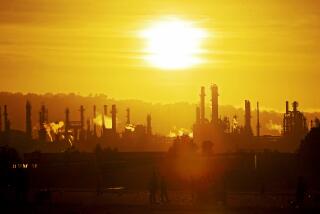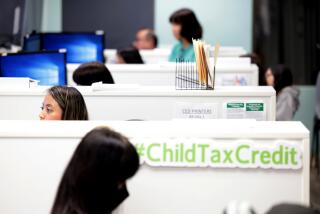‘Ozone Tax’ Campaign Riles Some Importers
- Share via
The San Gabriel Valley’s vast computer industry, dominated by Asian American entrepreneurs, says it has been targeted for selective enforcement of an obscure federal excise tax and aggressive Internal Revenue Service audits that have nearly destroyed some firms.
The “ozone tax” slaps fees on companies that import items made with chemicals that damage the Earth’s protective ozone layer. It covers everything from refrigerators and foam mattresses to camcorders and medical equipment.
But to collect the tax, IRS agents in Los Angeles for three years have aggressively audited small Asian American importers of parts used to build personal computers, even while other industries and even some major technology companies have been left alone.
Local entrepreneurs grumble about the financial impact of their ozone tax bills, which the IRS often sets at more than $1 million. They say it ends up costing them more than their annual income tax bills. By one count, the IRS has a 17-agent ozone squad in Los Angeles.
But the deepest outrage stems from a widespread belief that these audits are conducted in a selective, haphazard and inconsistent manner, and that these Asian American importers pay more as a result. Some members of the Southern California Chinese Computer Assn. suspect that racial stereotypes are fueling the ozone tax audits.
About half of the 200-plus companies in the association say they have been audited, a far higher audit rate than is normal for small businesses. The audits are concentrated among companies in the San Gabriel Valley, which has a large cluster of Asian American electronics importers.
One IRS target was Daniel Hou, president of Reyes Electronics and head of the SCCCA. His thriving Industry firm imports millions of computer keyboards, monitors, CD-ROM drives and other components. When the IRS audited Hou’s firm two years ago, he was hit with a $3-million ozone tax bill.
“My wife and I really thought we would have to close the company because we could hardly even imagine where we’d come up with that kind of money,” said Hou, whose company does about $40 million a year in sales. “It was a nightmare, a real nightmare.”
Hou and his wife Li, the company’s vice president for finance, worked frantically for eight months to fill 10 boxes with documents from their Chinese and Taiwanese suppliers to satisfy the IRS. Unsure of their final tax bill, they canceled $50,000 in scheduled Christmas bonuses for their 30 employees.
After two years of battling the IRS, Hou settled his case for more than $50,000 in back taxes and interest.
Because the IRS settles so many cases such as Hou’s for a fraction of the initial bill, critics suggest that the IRS is concocting its ozone tax assessments out of thin air. The tax can be calculated in any one of three ways, leaving the IRS plenty of room to maneuver, even when documentation is scanty.
“It’s not uncommon to find very, very large 1/8IRS 3/8 assessments with no real substance in back of them,” said Robert S. Schriebman, a Rolling Hills estate tax attorney. That’s why IRS auditors are so willing to settle these cases for “pennies on the dollar,” he said.
Hou’s case may be over, but for him the ozone tax issue is hardly settled.
“The IRS did tell us we are the first group of people to be targeted--that they were starting with Southern California and they’re starting with computer businesses,” Hou said.
IRS agents in Los Angeles insist they have audited companies in a variety of industries since stepping up enforcement of the ozone tax. They declined to name any of the companies, however, citing confidentiality rules.
“We’ve attempted to apply the tax uniformly to everyone--fire-extinguisher importers, telephones, electronics, pianos,” said Richard Little, a revenue agent with the Los Angeles office of the IRS.
Yet some of the biggest importers in the Los Angeles area--including toy maker Mattel Inc., consumer electronics firm Sharp Electronics and oil giant Atlantic Richfield Co.--said they have never been audited for the ozone tax.
And the world’s most valuable company apparently has escaped as well. Microsoft sells about $1 billion a year worth of video games, keyboards and other computer peripherals, some of them made overseas. Microsoft Vice President Robert Bach, who runs the Home and Retail division, said he had never heard of the ozone tax.
The ozone tax--officially Section 4681 of the Revenue Reconciliation Act of 1989--aims to discourage the use of chemicals that damage the Earth’s ozone layer. The chemicals, including chlorofluorocarbons and halons, are being phased out under an international treaty. Since the United States cannot force other countries to ban the chemicals, it placed the tax on U.S. companies that import items made with the chemicals in an attempt to discourage their use.
The IRS says it has no clear idea of how much it has collected in ozone taxes; agency records group it with other taxes that total $224 million since 1994.
IRS Denies Any Racial Connection
Archie Nakaoka, a group manager in the Los Angeles IRS office, denies any racial basis for the local audits. “We try to treat all taxpayers equal,” he said.
But others, including Koutech Systems President Jeff Tang, are not convinced. His Santa Fe Springs firm, with about a dozen employees and $8 million a year in sales, was originally billed by the IRS for $880,000 in ozone taxes. (He settled for $185,000 and later won a refund.)
IRS agents, Tang said, seem to assume that all Chinese Americans are wealthy, “so it’s nothing wrong to get a tax from these guys.”
Thomas Chan, a Los Angeles attorney, has represented several local tech companies that have been audited for ozone taxes. Asians tend to respect bureaucrats and shy away from legal battles, he said, and that makes them attractive targets for IRS auditors.
One company familiar with the ozone tax is Scientific Certification Systems in Oakland. SCS worked with the IRS to establish procedures for verifying how much of the offending chemicals are used in overseas factories. It also hires itself out to help companies defend themselves in IRS audits. SCS said that 24 of its 25 ozone tax clients are Asian American-owned computer firms in Southern California.
“It’s not fair,” said Leo Chang, chief executive of International Electronic Technology, an Industry firm that last year was ordered to pay $800,000 in ozone taxes. Chang’s company, which he started 12 years ago with a $1,000 loan from his mother, buys about half a million computer keyboards, motherboards, monitors, graphics cards and PC boxes a year that are resold to computer assemblers in this country.
“I had two choices: close the business or negotiate,” Chang said. “That’s 12 years of work that I don’t want to throw away. I also had to consider that it would mean 22 people without jobs.”
Chang’s accountant finally settled his case this year for $100,000 in back taxes and interest. Since the company was barely breaking even on annual sales of about $35 million, Chang poured $150,000 of his own money into the business to keep it going.
Given the slim profit margins and intense competition in the computer business, these companies often end up taking a bigger hit in ozone taxes than from income taxes.
Environmentalists have supported the tax’s goal of reducing ozone-depleting chemicals. But the tax remains so obscure that it has not served its primary purpose of encouraging importers to buy from environmentally friendly suppliers, said John Passacantado, executive director of the group Ozone Action, based in Washington. Instead, he said, the tax has motivated the IRS to “find culprits,” such as the San Gabriel Valley importers.
That may explain why Hou has counted 17 IRS agents in Los Angeles conducting ozone tax audits.
“Each auditor has different standards,” said Richard Chen, an El Monte accountant who has had three clients face audits for the tax. “They don’t have a very clear audit procedure or list of documents 1/8for 3/8 the taxpayer to provide.”
“Usually the proof that 1/8the IRS 3/8 requires is just impossible,” said attorney Chan. “They want to know what machine was being used at that time in 1990 or 1995. They want to know who mixed the chemicals, what was used. Then when you get people to provide those answers, the IRS will say, ‘Well, I don’t know that that’s real.’ So what do you do?”
No Two Cases Are the Same, IRS Says
Nakaoka of the IRS said that agents conduct their audits according to the same standards, but that no two cases are the same. “Each situation is different,” he said.
Other local IRS officials concede that their agents may have spent more time auditing computer companies for ozone taxes than other firms. If a disparity exists, it could be because more local companies import computer components than other items, the IRS said.
“Obviously, the numbers are drastically different,” revenue agent Little said. “How many piano seats do you run across, as opposed to computers, where there’s thousands and thousands of importers?”
What is clear is that word of the dreaded ozone tax audits spread quickly within the Asian American computer community, which imports items from throughout the Far East.
So when Tang, who runs Koutech Systems, was preparing for his audit, he consulted other firms that had already been through the process to find out what documents he needed. Tang prepared an inch-thick file about the printer cards, video-adapter cards and motherboards that he imports, including letters from his supplier in Taiwan and a report from Scientific Certification Systems that supported his case.
But before Tang’s IRS auditor even read the file, he asked Tang to produce documents for all of the companies that sold components to his main supplier in Taiwan. When Tang complied, he said, the auditor declared those documents to be fakes.
“Why bother to come over and do the audit?” said the combative executive.
IRS officials would not comment on Tang’s case.
Gathering information to fight the IRS auditors can be a challenge, companies have found. Electronics suppliers in Asia are not always willing to cooperate. Sometimes the manufacturers refuse to reveal what chemicals they use, saying that information is a trade secret. Another difficulty is tracking down documents that are more than a year or two old.
Finding these documents is critical because the IRS can calculate the ozone tax in three ways: Each imported item can be taxed at a flat amount listed in an IRS table; the tax can be assessed at 1% of the total value of the imported goods; or importers can calculate the amount of ozone-depleting chemicals used to manufacture the specific products they buy.
The last method usually produces the lowest tax bill.
Linda Brown, co-founder and senior associate of Scientific Certification Systems, said companies that hire her firm to document chemical use typically save tens of thousands of dollars compared with other calculation methods.
But that option is viable only if the records are still available. And when an audit occurs six or seven years after the fact, they usually aren’t.
More to Read
Sign up for Essential California
The most important California stories and recommendations in your inbox every morning.
You may occasionally receive promotional content from the Los Angeles Times.










